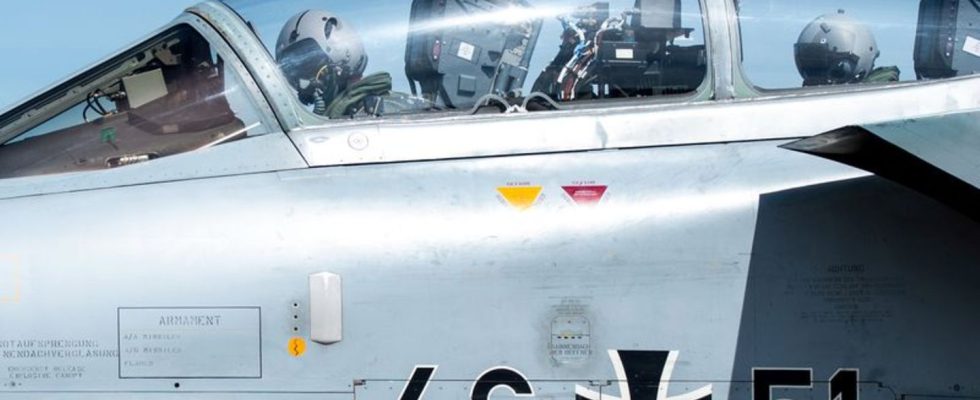“Air Defender 2023”
Air Force exercise with 146 aircraft launches on Monday
Preparations for the large-scale international exercise over parts of Germany have been completed – “Air Defender 2023” begins on Monday. photo
© Daniel Bockwoldt/dpa
There has never been such an air force maneuver over Germany: At the beginning of the week, air forces from 25 countries fended off a fictitious enemy from the east. It gets loud regionally.
The countdown is on for the largest air force relocation exercise since NATO was founded: Germany and 24 other countries – including NATO partner Sweden, which is waiting to be admitted – will practice defending alliance territory against an attacker and recapturing contested areas from Monday.
The Air Force announced that 146 aircraft takeoffs were planned for the start on Monday. It starts at 10 a.m. on Monday. The operational order – the Air Tasking Order (ATO) – for the forces involved had been available since Saturday. In the host country Germany, the command post responsible for the northern NATO area in Uedem (North Rhine-Westphalia) is now leading the exercise.
The exercise has been planned since 2018, i.e. after the Russian annexation of Crimea, but well before Russia’s war of aggression against all of Ukraine. In the scenario, the fictional eastern alliance OCCASUS is the opponent. After years of confrontation with OCCASUS, the conflict has reached the Federal Republic. The western alliance triggers the defense case according to article 5 of the NATO treaty.
It fights blue against red
In the scenario, the OCCASUS alliance tries to advance to the Baltic Sea and take possession of the port of Rostock. It also uses sabotage actions and the deployment of special forces, which are supported from the air.
“Special forces from the Brückner organization and other troops from OCCASUS were able to smuggle into Germany from the east. Now air and ground forces are occupying the entire Klebius region, about a quarter of the country,” writes the Bundeswehr about the exercise.
Day 1 of the Counterattack: Blue fights against Red, the enemy. It is about close air support for our own soldiers in combat on the ground and “2 against 2” in the air, i.e. the fight of aircraft against other aircraft.
The NATO partners strive for air superiority and go through the course of missions together and with machines in the air. To this end, aircraft from different countries collect in areas known as “assembly areas”: First, special aircraft for electronic warfare (Eloka) identify and suppress enemy radar and anti-aircraft positions. Fighter planes then fight the enemy in the air. Then bombers are used against targets on the ground. Reconnaissance machines fly above everything, and tanker planes ensure there is sufficient fuel – to put it simply.
Lieutenant General: “We also show strength”
The interaction and common tactics are practiced, as Lieutenant General Günther Katz, Commanding General of the Air Force Troops Command, says in the Bundeswehr format “Questioned”. “We are also showing strength, I think, by also demonstrating that we are defensive and that we are also prepared to defend every square inch of Alliance territory against any possible adversary,” he said.
The main dogfight takes place at an altitude of up to 20 kilometers, higher than the civilian airlines fly. There will also be low-level flights, but primarily at military training areas.
From June 12 to June 23, 25 nations and 10,000 soldiers with 250 aircraft, including 70 military aircraft from Germany, will take part in the exercise under German leadership. The exercise will primarily take place in three airspaces over parts of northern Germany and the North Sea. The training is carried out in stages. Even if the scenario is about Rostock, not only targets in the surrounding area of the city are fought – of course.
Nevertheless: It can be regionally loud and also narrow in the sky over Germany. There are also different assessments of the impairments to civil air traffic. “It will be a matter of minutes at most,” said the inspector of the German Air Force, Ingo Gerhartz, last week about possible flight delays. In addition, the exercise runs before the school holidays and the big holiday travel wave.
The air traffic controllers’ union GdF had previously made a different forecast. The military exercise “will of course have a massive impact on the course of civil aviation,” said its chairman Matthias Maas.
protest peace initiatives
There is no doubt that Russia in particular is following the process very closely. At a press conference with Gerhartz, US Ambassador Amy Gutmann made it clear that the exercise is also sending a signal of strength to Russian President Vladimir Putin. She said: “I would be very surprised if any world leader did not take note of what this (the maneuver) shows in terms of the spirit of this alliance, that is, the strength of this alliance. And that includes Mr. Putin .”
Before the start of the international maneuver, hundreds of people demonstrated in front of the Wunstorf air base in the Hanover region on Saturday. Peace initiatives had called for the demonstration under the motto “Practice peace – instead of war”. The demonstrators called for diplomatic solutions and a ceasefire in the war in Ukraine. Banners with the inscription “Down with arms! No to war! Disarmament now!” According to a police spokesman, a total of around 300 people gathered peacefully.

